人教新目标(Go for it)版七年级下册Unit 11 How was your school trip? Section B 2a-2c课件(共30张PPT)
文档属性
| 名称 | 人教新目标(Go for it)版七年级下册Unit 11 How was your school trip? Section B 2a-2c课件(共30张PPT) |
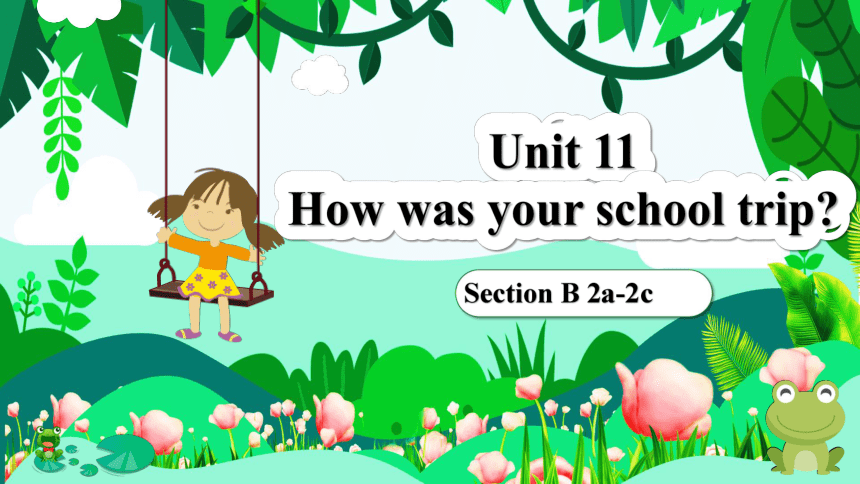
|
|
| 格式 | pptx | ||
| 文件大小 | 17.7MB | ||
| 资源类型 | 教案 | ||
| 版本资源 | 人教新目标(Go for it)版 | ||
| 科目 | 英语 | ||
| 更新时间 | 2024-06-04 17:19:29 | ||
图片预览

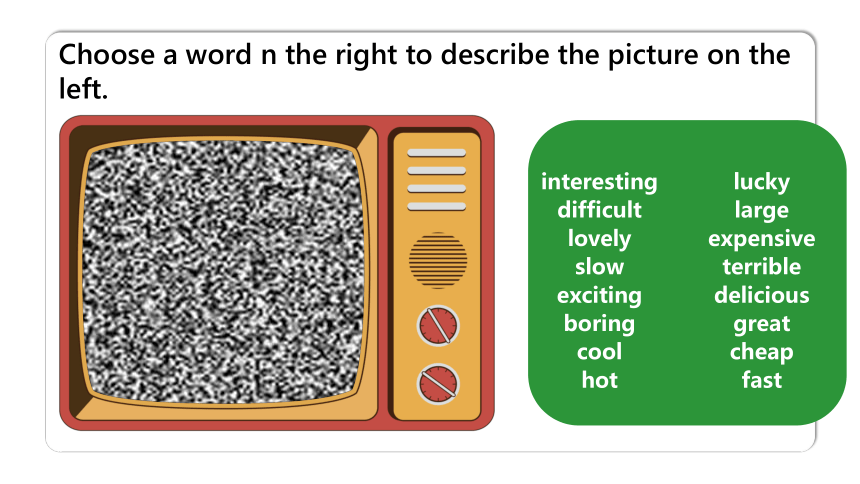
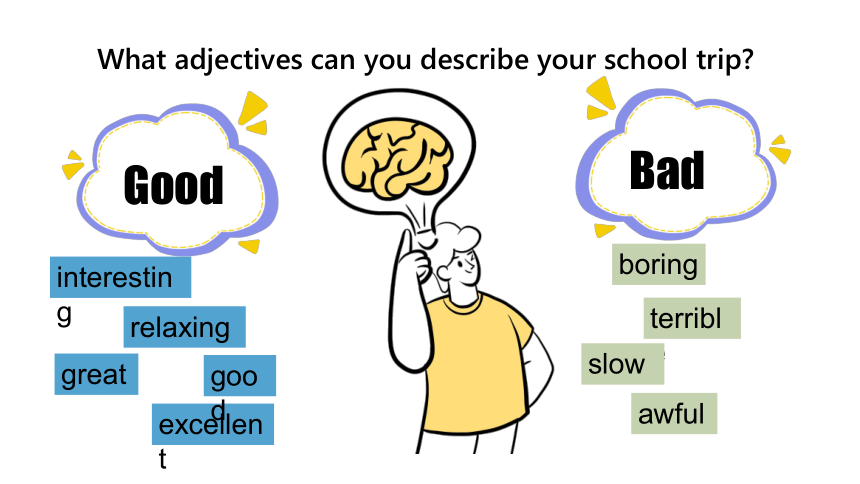
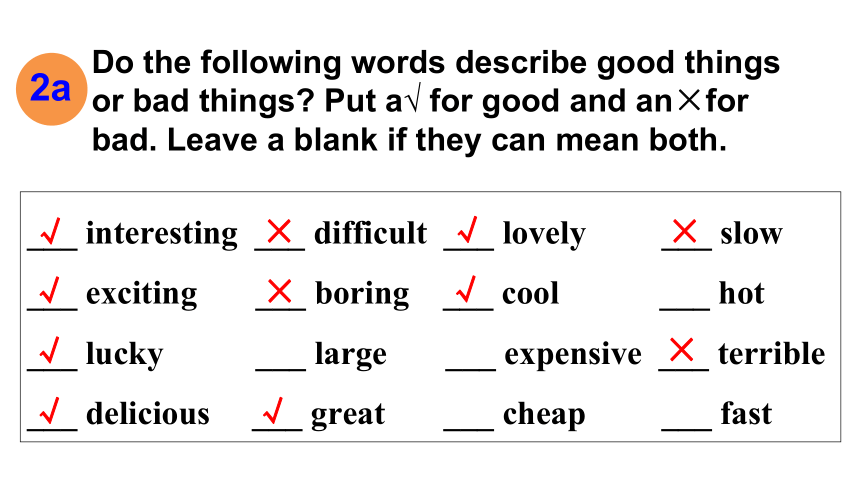
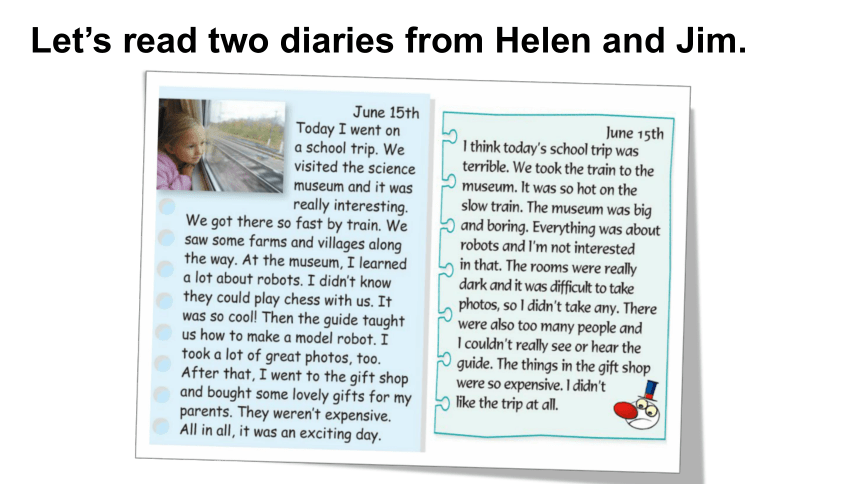
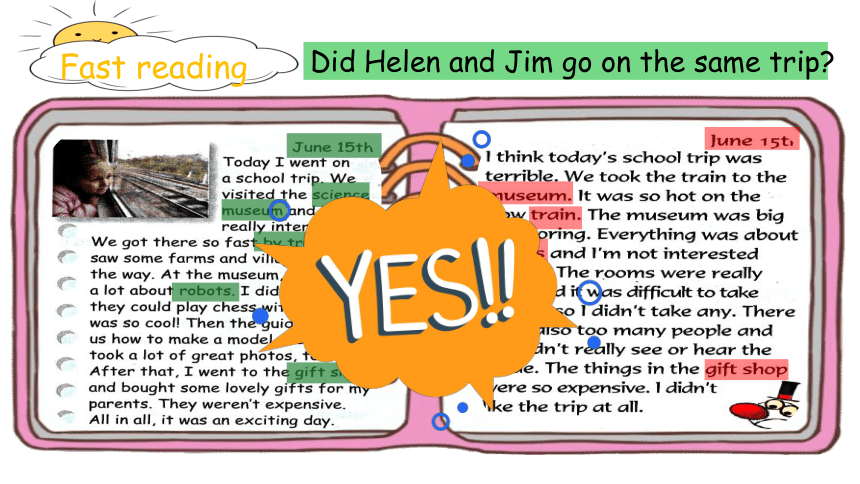
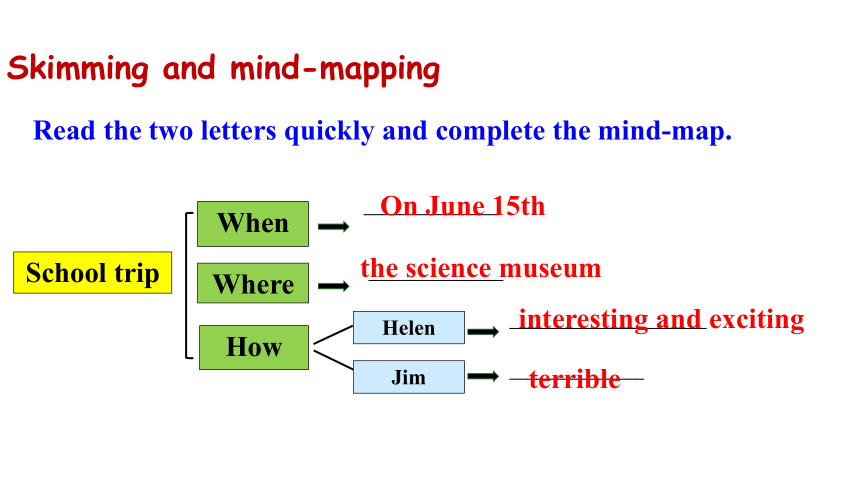
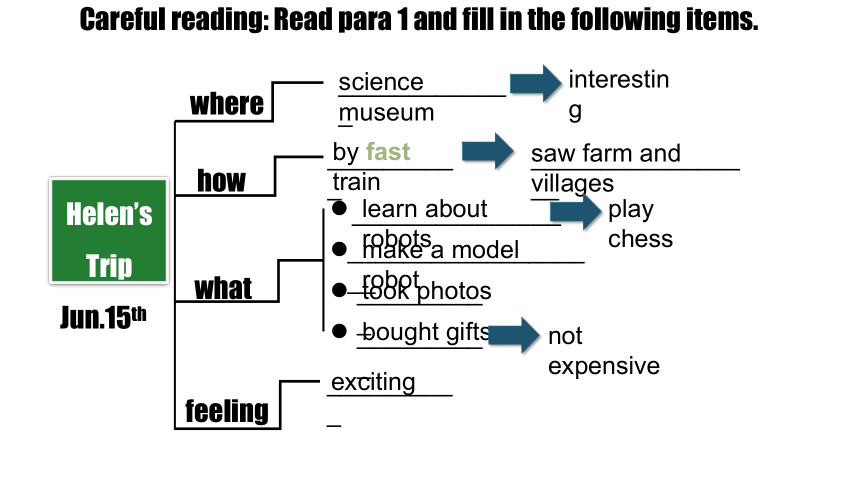
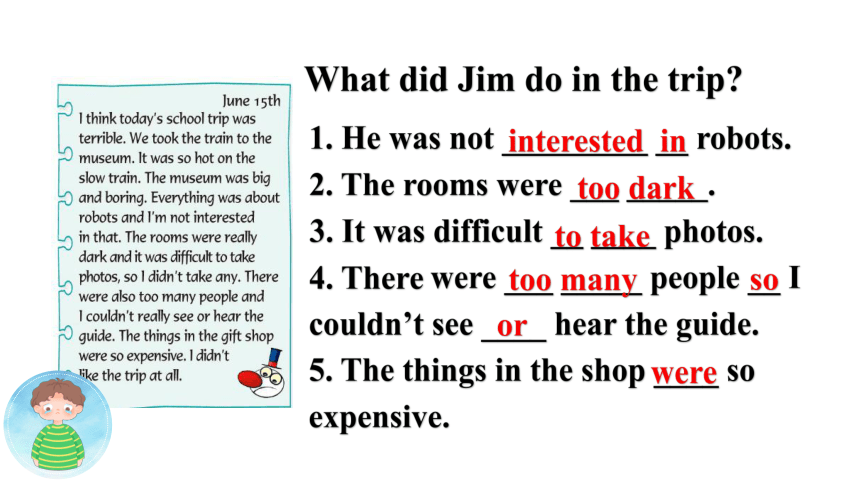
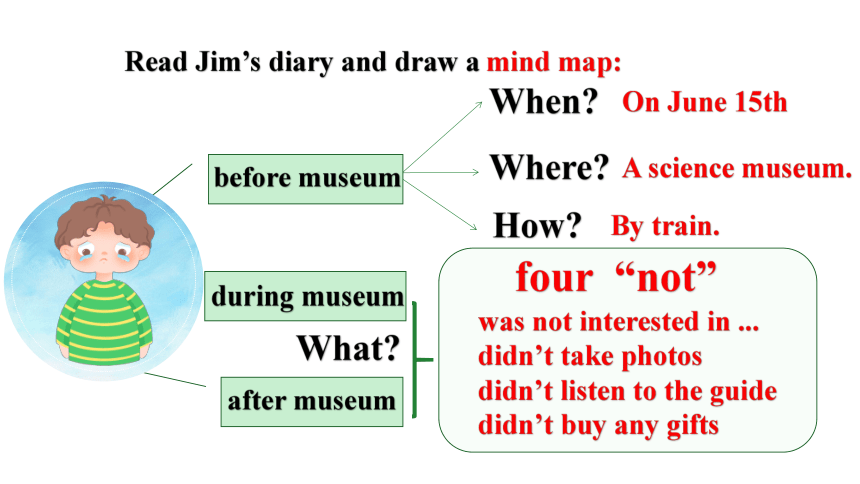
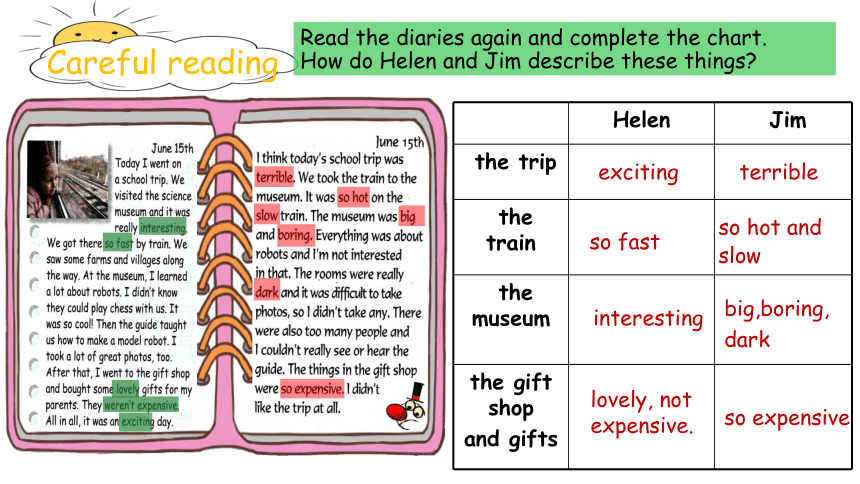
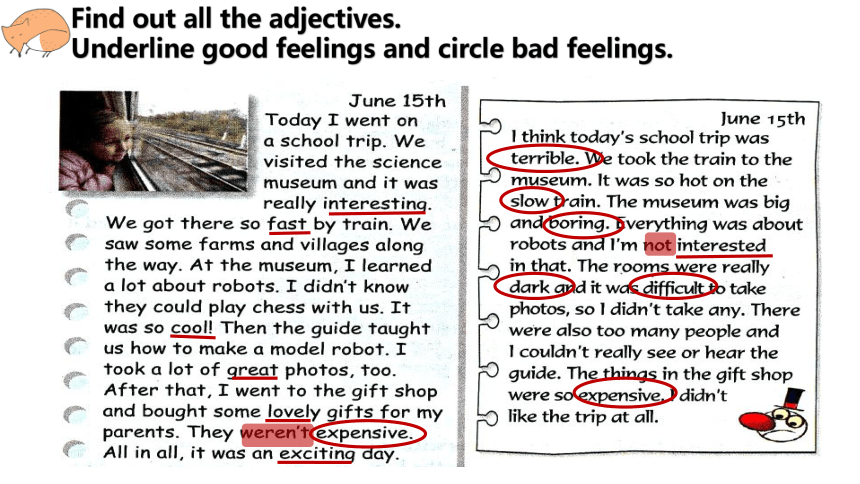
文档简介
(共30张PPT)
Section B 2a-2c
Unit 11
How was your school trip
Unit 11
How was your school trip
interesting
difficult
lovely
slow
exciting
boring
cool
hot
lucky
large
expensive
terrible
delicious
great
cheap
fast
Choose a word n the right to describe the picture on the left.
What adjectives can you describe your school trip
Good
Bad
interesting
relaxing
great
excellent
boring
terrible
slow
awful
good
2a
Do the following words describe good things or bad things Put a√ for good and an×for bad. Leave a blank if they can mean both.
___ interesting ___ difficult ___ lovely ___ slow
___ exciting ___ boring ___ cool ___ hot
___ lucky ___ large ___ expensive ___ terrible
___ delicious ___ great ___ cheap ___ fast
√
×
√
×
√
×
√
√
×
√
√
Let’s read two diaries from Helen and Jim.
Fast reading
Did Helen and Jim go on the same trip
Skimming and mind-mapping
Read the two letters quickly and complete the mind-map.
School trip
When
Where
How
Helen
Jim
_______________
_______________
______________________
_______________
On June 15th
the science museum
interesting and exciting
terrible
_____________
__________
_________________
___________________
__________
_______________
__________
__________
Helen’s Trip
where
how
what
feeling
science museum
interesting
by fast train
saw farm and villages
learn about robots
make a model robot
took photos
bought gifts
play chess
not expensive
exciting
Careful reading: Read para 1 and fill in the following items.
Jun.15th
What did Jim do in the trip
1. He was not _________ __ robots.
2. The rooms were ___ _____.
3. It was difficult __ ____ photos.
4. There were ___ _____ people __ I couldn’t see ____ hear the guide.
5. The things in the shop ____ so expensive.
interested in
too dark
to take
too many
so
or
were
Read Jim’s diary and draw a mind map:
before museum
after museum
during museum
What
On June 15th
A science museum.
By train.
When
Where
How
four “not”
was not interested in ...
didn’t take photos
didn’t listen to the guide
didn’t buy any gifts
Careful reading
Read the diaries again and complete the chart.
How do Helen and Jim describe these things
Helen Jim
the trip
the train
the museum
the gift shop and gifts
exciting
terrible
so fast
so hot and slow
interesting
big,boring,dark
lovely, not
expensive.
so expensive
Find out all the adjectives.
Underline good feelings and circle bad feelings.
Positive adjectives Negative adjectives
interesting
fast
cool
great
exciting
big
interested
expensive
hot
slow
boring
dark
difficult
Find out all the past forms.
Write down their regular forms.
regular form
past tense form
go
is
see
do
teach
buy
visit
get
can
take
are
went
was
saw
did
taught
bought
visited
got
could
took
were
Passage structure
Helen’s trip
Feelings
Activities
interesting, exciting
by train→saw→learned a lot→how to make a model robot→took a lot of great photos→went to the gift shop→bought some lovely gifts
Jim’s trip
Feelings
Activities
terrible, didn’t like the trip at all
took the train→not interested in robots→didn’t take any… →
couldn’t really see or hear the guide
place
activities
feelings
date
How to write a diary
Different people may have different ideas
towards the same thing.
transportation
trip
Language points
1. exciting adj. 使人兴奋的;令人激动的
exciting “使人兴奋的;令人激动的”,常用于修饰物,表示事物本身让人兴奋、激动。
excited “感到兴奋的”,常用于修饰人,表示人的主观感受。
e.g. We are excited at the exciting news.
我们因为那个激动人心的消息而激动万分。
【易混辨析】exciting与excited
2.Then the guide taught us how to make a model robot.
【长难句分析】
guide
n. 导游
n. 指南;指导手册
v. 带领;引导
你可以使用车上的导航地图。
You can use the guide map in your car.
老师正带领着学生们过马路。
The teacher is guiding students to cross the road.
The guide with a guide is guiding us trough the forest.
那个拿着旅游指南的导游正领着我们穿越森林。
Then the guide taught us how to make a model robot.
【长难句分析】
特殊疑问词
动词不定式短语
teach sb. sth.
整体做“宾语”
Then the guide taught us how to make a model robot.
我不知道怎样拼写这个单词。
I don’t know how to spell this words.
我不知道接下来做什么。
他没有告诉我去哪里。
I don’t know what to do next.
He doesn’t tell me where to go.
3. All in all, it was an exciting day. 总的说来,这是令人兴奋的一天。
all in all 总的说来
【用法详解】all in all常放在句首,用来对之前所说的内容进行归纳或总结。意义及用法类似的短语有:in a word(总之), in short(简而言之)。
All in all/In a word/In short, this is a good book. 总的说来,这是一本好书。
4. Everything was about robots and I’m not interested in that. 一切
都是关于机器人的,我对那方面不感兴趣。
【用法详解】everything是不定代词,作主语时,谓语动词用第三人称单数形式。
Everything goes well. 一切进展顺利。
It’s very important to make a plan before we do everything. 我们在做所有事情之前先制订一个计划是非常重要的。
everything pron. 所有事物;一切
be interested in 对 …… 感兴趣
【用法详解】该结构中in为介词,其后接名词、代词或动词-ing形式作宾语。
He is interested in basketball. 他对篮球感兴趣。
Lisa is interested in singing and dancing. 莉萨对唱歌和跳舞感兴趣。
【拓展延伸】interest作名词,意为“兴趣;关注” ,have (an)
interest in sth. 表示“ 对......有兴趣”。
I have an interest in film music. 我对电影音乐感兴趣。
【易混辨析】 interesting与interested
interesting 意为"有趣的", 表示事物的性 质特征。 This is an interesting story. 这是一个有趣的故事。
interested 意为"感兴趣 的",表示人的 主观感受。 He is interested in music.
他对音乐感兴趣。
5. There were also too many people and I couldn’t really see or hear the guide. 而且人太多,我真的看不见导游,也听不清导游说什么。
hear v. 听到;听见
hear 及物动词 强调听的结果,其后直接接宾语。
listen 不及物动词 强调听的动作,其后跟宾语时要加介词to。
【易混辨析】hear与listen
I listened carefully, but heard nothing.
我仔细听了,但什么也没有听到。
Boys and girls, please listen to me. 同学们,请听我说。
6. I didn’t like the trip at all. 我一点儿都不喜欢这次旅行。
not…at all 一点儿也不
【用法详解】not…at all表示强烈的否定意味。
Tom doesn’t like dancing at all. 汤姆一点儿也不喜欢跳舞。
【拓展延伸】not at all的用法:
(1) 用来回答别人对你的感谢,意为“不客气,不用谢”。
—Thank you very much for lending me your bike.
非常感谢你借给我自行车。
—Not at all. 不客气。
Exercise
1. — It’s important for us to know ____ all the
subjects.
— Yeah, group work is my favorite.
A. how to study B. when to study
C. which to study D. what to study
一、单项选择。
2. _________, I had a good time today.
A. Although B. All in all
C. All the time D. All right
3. Ms. Black is a _______. Her job is to take people
to visit some interesting places.
A. singer B. farmer
C. guide D. artist
4. — _________! Someone is singing in the next
room.
— But I can’t _________ anything at all.
A. Listen; listen B. Listen; hear
C. Hear; hear D. Hear; listen
1. Can you teach me how _______ (use) a computer
2. When she got into the room, she ______ (hear)
students saying “Happy birthday to you”.
3. That is an _________ (excite) book.
4. My brother got many birthday ______ (gift)
yesterday.
二、用所给单词的适当形式填空。
to use
heard
exciting
gifts
Section B 2a-2c
Unit 11
How was your school trip
Unit 11
How was your school trip
interesting
difficult
lovely
slow
exciting
boring
cool
hot
lucky
large
expensive
terrible
delicious
great
cheap
fast
Choose a word n the right to describe the picture on the left.
What adjectives can you describe your school trip
Good
Bad
interesting
relaxing
great
excellent
boring
terrible
slow
awful
good
2a
Do the following words describe good things or bad things Put a√ for good and an×for bad. Leave a blank if they can mean both.
___ interesting ___ difficult ___ lovely ___ slow
___ exciting ___ boring ___ cool ___ hot
___ lucky ___ large ___ expensive ___ terrible
___ delicious ___ great ___ cheap ___ fast
√
×
√
×
√
×
√
√
×
√
√
Let’s read two diaries from Helen and Jim.
Fast reading
Did Helen and Jim go on the same trip
Skimming and mind-mapping
Read the two letters quickly and complete the mind-map.
School trip
When
Where
How
Helen
Jim
_______________
_______________
______________________
_______________
On June 15th
the science museum
interesting and exciting
terrible
_____________
__________
_________________
___________________
__________
_______________
__________
__________
Helen’s Trip
where
how
what
feeling
science museum
interesting
by fast train
saw farm and villages
learn about robots
make a model robot
took photos
bought gifts
play chess
not expensive
exciting
Careful reading: Read para 1 and fill in the following items.
Jun.15th
What did Jim do in the trip
1. He was not _________ __ robots.
2. The rooms were ___ _____.
3. It was difficult __ ____ photos.
4. There were ___ _____ people __ I couldn’t see ____ hear the guide.
5. The things in the shop ____ so expensive.
interested in
too dark
to take
too many
so
or
were
Read Jim’s diary and draw a mind map:
before museum
after museum
during museum
What
On June 15th
A science museum.
By train.
When
Where
How
four “not”
was not interested in ...
didn’t take photos
didn’t listen to the guide
didn’t buy any gifts
Careful reading
Read the diaries again and complete the chart.
How do Helen and Jim describe these things
Helen Jim
the trip
the train
the museum
the gift shop and gifts
exciting
terrible
so fast
so hot and slow
interesting
big,boring,dark
lovely, not
expensive.
so expensive
Find out all the adjectives.
Underline good feelings and circle bad feelings.
Positive adjectives Negative adjectives
interesting
fast
cool
great
exciting
big
interested
expensive
hot
slow
boring
dark
difficult
Find out all the past forms.
Write down their regular forms.
regular form
past tense form
go
is
see
do
teach
buy
visit
get
can
take
are
went
was
saw
did
taught
bought
visited
got
could
took
were
Passage structure
Helen’s trip
Feelings
Activities
interesting, exciting
by train→saw→learned a lot→how to make a model robot→took a lot of great photos→went to the gift shop→bought some lovely gifts
Jim’s trip
Feelings
Activities
terrible, didn’t like the trip at all
took the train→not interested in robots→didn’t take any… →
couldn’t really see or hear the guide
place
activities
feelings
date
How to write a diary
Different people may have different ideas
towards the same thing.
transportation
trip
Language points
1. exciting adj. 使人兴奋的;令人激动的
exciting “使人兴奋的;令人激动的”,常用于修饰物,表示事物本身让人兴奋、激动。
excited “感到兴奋的”,常用于修饰人,表示人的主观感受。
e.g. We are excited at the exciting news.
我们因为那个激动人心的消息而激动万分。
【易混辨析】exciting与excited
2.Then the guide taught us how to make a model robot.
【长难句分析】
guide
n. 导游
n. 指南;指导手册
v. 带领;引导
你可以使用车上的导航地图。
You can use the guide map in your car.
老师正带领着学生们过马路。
The teacher is guiding students to cross the road.
The guide with a guide is guiding us trough the forest.
那个拿着旅游指南的导游正领着我们穿越森林。
Then the guide taught us how to make a model robot.
【长难句分析】
特殊疑问词
动词不定式短语
teach sb. sth.
整体做“宾语”
Then the guide taught us how to make a model robot.
我不知道怎样拼写这个单词。
I don’t know how to spell this words.
我不知道接下来做什么。
他没有告诉我去哪里。
I don’t know what to do next.
He doesn’t tell me where to go.
3. All in all, it was an exciting day. 总的说来,这是令人兴奋的一天。
all in all 总的说来
【用法详解】all in all常放在句首,用来对之前所说的内容进行归纳或总结。意义及用法类似的短语有:in a word(总之), in short(简而言之)。
All in all/In a word/In short, this is a good book. 总的说来,这是一本好书。
4. Everything was about robots and I’m not interested in that. 一切
都是关于机器人的,我对那方面不感兴趣。
【用法详解】everything是不定代词,作主语时,谓语动词用第三人称单数形式。
Everything goes well. 一切进展顺利。
It’s very important to make a plan before we do everything. 我们在做所有事情之前先制订一个计划是非常重要的。
everything pron. 所有事物;一切
be interested in 对 …… 感兴趣
【用法详解】该结构中in为介词,其后接名词、代词或动词-ing形式作宾语。
He is interested in basketball. 他对篮球感兴趣。
Lisa is interested in singing and dancing. 莉萨对唱歌和跳舞感兴趣。
【拓展延伸】interest作名词,意为“兴趣;关注” ,have (an)
interest in sth. 表示“ 对......有兴趣”。
I have an interest in film music. 我对电影音乐感兴趣。
【易混辨析】 interesting与interested
interesting 意为"有趣的", 表示事物的性 质特征。 This is an interesting story. 这是一个有趣的故事。
interested 意为"感兴趣 的",表示人的 主观感受。 He is interested in music.
他对音乐感兴趣。
5. There were also too many people and I couldn’t really see or hear the guide. 而且人太多,我真的看不见导游,也听不清导游说什么。
hear v. 听到;听见
hear 及物动词 强调听的结果,其后直接接宾语。
listen 不及物动词 强调听的动作,其后跟宾语时要加介词to。
【易混辨析】hear与listen
I listened carefully, but heard nothing.
我仔细听了,但什么也没有听到。
Boys and girls, please listen to me. 同学们,请听我说。
6. I didn’t like the trip at all. 我一点儿都不喜欢这次旅行。
not…at all 一点儿也不
【用法详解】not…at all表示强烈的否定意味。
Tom doesn’t like dancing at all. 汤姆一点儿也不喜欢跳舞。
【拓展延伸】not at all的用法:
(1) 用来回答别人对你的感谢,意为“不客气,不用谢”。
—Thank you very much for lending me your bike.
非常感谢你借给我自行车。
—Not at all. 不客气。
Exercise
1. — It’s important for us to know ____ all the
subjects.
— Yeah, group work is my favorite.
A. how to study B. when to study
C. which to study D. what to study
一、单项选择。
2. _________, I had a good time today.
A. Although B. All in all
C. All the time D. All right
3. Ms. Black is a _______. Her job is to take people
to visit some interesting places.
A. singer B. farmer
C. guide D. artist
4. — _________! Someone is singing in the next
room.
— But I can’t _________ anything at all.
A. Listen; listen B. Listen; hear
C. Hear; hear D. Hear; listen
1. Can you teach me how _______ (use) a computer
2. When she got into the room, she ______ (hear)
students saying “Happy birthday to you”.
3. That is an _________ (excite) book.
4. My brother got many birthday ______ (gift)
yesterday.
二、用所给单词的适当形式填空。
to use
heard
exciting
gifts
同课章节目录
- Unit 1 Can you play the guitar?
- Section A
- Section B
- Unit 2 What time do you go to school?
- Section A
- Section B
- Unit 3 How do you get to school?
- Section A
- Section B
- Unit 4 Don't eat in class.
- Section A
- Section B
- Unit 5 Why do you like pandas?
- Section A
- Section B
- Unit 6 I'm watching TV.
- Section A
- Section B
- Review of Units 1-6
- Unit 7 It's raining!
- Section A
- Section B
- Unit 8 Is there a post office near here?
- Section A
- Section B
- Unit 9 What does he look like?
- Section A
- Section B
- Unit 10 I'd like some noodles.
- Section A
- Section B
- Unit 11 How was your school trip?
- Section A
- Section B
- Unit 12 What did you do last weekend?
- Section A
- Section B
